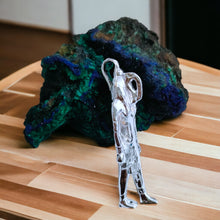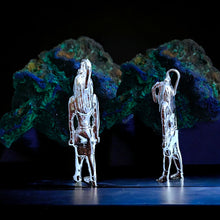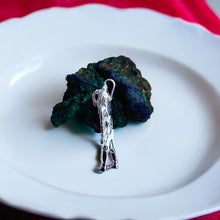The God Thoth The Scribe Silver Pendant Necklace: Inspired by the ancient Egyptian deity Thoth, known as the god of wisdom, writing, and magic. Thoth was revered for his role as the divine scribe, recording the deeds of gods and humans alike. This pendant pays homage to his significance in history and mythology, crafted intricately in sterling silver to evoke the mystique and power of ancient Egypt.
- History: Inspired by ancient Egyptian culture, dedicated to the deity Thoth, the god of wisdom, writing, and magic.
- Spiritually: Represents divine knowledge, communication, and the power of words.
- Talisman: Believed to bring wisdom, protection, and guidance to the wearer.
- Handmade: Crafted with care and attention to detail, each piece is unique.
- Healing: Thought to promote mental clarity, intuition, and spiritual growth.
- Material Silver: Made from high-quality silver, symbolizing purity and strength.
- Symbolism: Features symbols associated with Thoth, such as the ibis bird and the stylus.
- How to Wear: Can be worn on any chain up to 5mm in thickness, close to the heart for maximum effect.
- Ideal Gift: Perfect for anyone seeking knowledge, inspiration, or spiritual connection.
History Side For Those Who Are Interested
Thoth, revered in ancient Egyptian mythology as the god of wisdom, writing, and magic, occupies a significant place in the pantheon of ancient Egyptian deities. The history of Thoth, often depicted with the head of an ibis or a baboon, is intertwined with the development of Egyptian civilization, particularly in the domains of knowledge, language, and literature.
The origins of Thoth trace back to the early periods of Egyptian history, possibly emerging in the Predynastic Period (c. 6000–3150 BCE) or even earlier. Initially, he was depicted as the god of the moon, mediating between the forces of light and darkness. Over time, his role expanded to encompass various intellectual pursuits, earning him titles such as "Lord of Divine Words" and "Scribe of the Gods."
Thoth's association with writing and communication stemmed from the ancient Egyptians' recognition of the importance of record-keeping and documentation in their society. As such, he became the patron deity of scribes, who played a crucial role in administrative affairs, religious rituals, and the preservation of knowledge. The ancient Egyptians credited Thoth with the invention of writing itself, attributing to him the creation of hieroglyphs, the intricate system of pictorial symbols used in ancient Egyptian script.
In addition to his role as a divine scribe, Thoth was revered as a mediator and arbitrator among the gods, often resolving disputes and maintaining cosmic balance. He was also believed to possess great magical knowledge, capable of healing the sick, controlling the forces of nature, and guiding souls through the afterlife.
Thoth's influence extended beyond the realm of religion and mythology, permeating various aspects of Egyptian culture and society. Temples dedicated to Thoth were built throughout Egypt, and his worship remained prevalent across different periods of Egyptian history. His wisdom and intellectual prowess were celebrated in ancient Egyptian literature, where he was frequently depicted as a wise counselor and a custodian of esoteric knowledge.
One of the most enduring myths associated with Thoth is the "Contendings of Horus and Set," in which he plays a pivotal role in the struggle between the two rival deities for the throne of Egypt. In this myth, Thoth acts as a mediator and judge, ultimately facilitating the ascension of Horus as the rightful ruler of Egypt.
The legacy of Thoth endured well beyond the decline of ancient Egyptian civilization. His influence can be traced in later cultures, including the Greeks, who identified him with their god Hermes, the messenger of the gods and patron of scholars and travelers.
In summary, Thoth the scribe stands as a symbol of wisdom, intellect, and the written word in ancient Egyptian mythology. His multifaceted role reflects the importance of knowledge and communication in the development of Egyptian civilization, leaving an indelible mark on the cultural and intellectual landscape of ancient Egypt and beyond.








